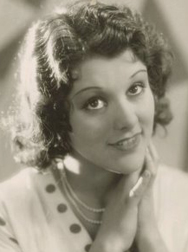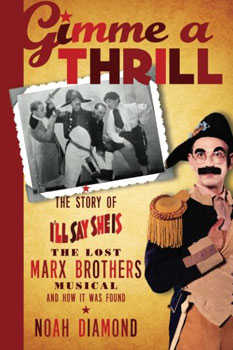Gloria Stuart was born on Independence Day, 1910, in Santa Monica, California. In 1999, when she was just a kid of 89, we got to interview her on the occasion of the publication of her memoir, I Just Kept Hoping. The interview was conducted over the telephone, though we did get the chance to meet Ms. Stuart when she came to NYC for her book party.

We considered it quite a thrill, we don’t mind telling you, to get to interact with Ms. Stuart. After all, this is the women who starred opposite Claude Rains in James Whale‘s The Invisible Man, who appeared with Boris Karloff, Melvyn Douglas, and Charles Laughton in The Old Dark House, who worked with greats such as Irene Dunne, Ralph Bellamy, Pat O’Brien, Lionel Barrymore, Lee Tracy, Nancy Carroll, Frank Morgan, Paul Lukas, Edward Arnold, Eddie Cantor, Ruth Etting, and dozens more.
So, to celebrate her 111th birthday, we thought we’d share the interview we did with her in 1999. Enjoy!
It’s been a long, eventful life for former and current movie star Gloria Stuart. She had her first go-around at stardom in the Hollywood heyday of the 1930s and ’40s; then, after taking off 30 years or so to pursue painting, travel, and political activism, she again began to act in the 1970s, eventually garnering a Best Supporting Actress nomination for her role in Titanic. Still going strong today at the age of 89, Stuart has now added authorship to her list of achievements. Her candid memoir, I Just Kept Hoping, is peppered with anecdotes about such memorable figures as Shirley Temple, Groucho Marx, Dorothy Parker, and J. Robert Oppenheimer, the father of the atomic bomb. We spoke to Gloria about her life, her two careers in the movies, and her secrets for living so long and so well.
An Interview with Gloria Stuart
You made three films with director James Whale: The Invisible Man, The Old Dark House, and The Kiss Before the Mirror. What can you tell us about him?
I’m very happy I was in those films. You know, James is a cult figure in England. There are a lot of James Whale fan clubs. Actually, right after I had read for Jim Cameron for Titanic, I had booked a month in London. I went right away, and there were two wonderful James Whale organizations that I met with. He’s getting his due now, thanks to Gods and Monsters.
What did you think of Gods and Monsters? Was it, in your view, an accurate portrayal of Whale?
Oh, yes, it was. Ian McKellan captured James’s elegance, the beautiful manners, the beautiful tailoring, the precision, the whole thing. Of course, no one could be James, but he came awfully close.
The special effects in The Invisible Man hold up remarkably well today for a film that was made in 1933.
Yes, people who see it today—it runs every so often—they say, gee, it’s not an old hat movie at all.
I’m wondering—did the processes that went into creating those special effects slow down the pace of moviemaking at all?
It was never evident. Only James and the cameraman and I guess all the process people at Universal—the rest of us never had any inkling of what was going on. We did do a lot of shooting in front of black curtains. Now, I wasn’t on the set when the bandages came off or anything like that, so I have no idea about that. But it was very, very secret. I wasn’t on the set when they were finagling the bandages off, and so forth.
That would’ve been fun to see.
Yes, it would’ve! Claude [Rains] may have known [how it all worked] but he never said so.
You and your second husband, Arthur Sheekman, were good friends with Humphrey Bogart and Mayo Methot, his wife at the time. What can you tell us about Bogie that we might not know?
Read More »




